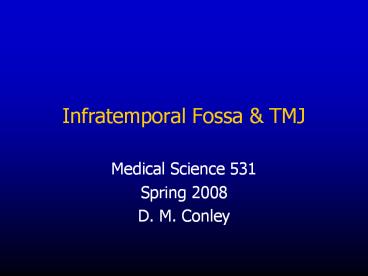Infratemporal Fossa PowerPoint PPT Presentation
1 / 37
Title: Infratemporal Fossa
1
Infratemporal Fossa TMJ
- Medical Science 531
- Spring 2008
- D. M. Conley
2
(No Transcript)
3
(No Transcript)
4
(No Transcript)
5
(No Transcript)
6
Muscles of Mastication
7
Temporalis
Masseter
8
(No Transcript)
9
Vertical fibers
Horizontal fibers
10
Pterygoid muscles Medial and lateral
Originate from the medial and lateral pterygoid
plates thus their names.
11
(No Transcript)
12
The Grind
Alternating contraction of muscles produces
side-to-side and rotary movements of mandible
EXAMPLE Left medial pterygoid Right masseter
Move mandible to the RIGHT.
13
Masticator fascial space
Loose areolar CT in masticator space
Note that a layer a deep fascia prevents
communication with fascial spaces around the
pharynx.
14
Nerves of the ITF
15
Mandibular division of CN V (V3)
16
Lateral pterygoid m.
Medial pterygoid m.
Lingual n.
Buccal n.
17
V3 Lateral pterygoid removed
Deep temporal nn.
Buccal n.
Lingual n. Inferior alveolar n.
Auriculotemporal n.
18
Other nerves in the ITF
Foramen ovale
Pterygomaxillary fissure
Posterior superior alveolar nerve from V2
19
Innervation of the teeth
Upper V2 Superior alveolar nerves ? Posterior
? Middle
? Anterior
Lower V3 Inferior alveolar nerve
20
Parasympathetic pathways through the ITF
Lesser petrosal n. (from CN IX)
Chorda tympani n. (from CN VII)
Otic ganglion !!
This is a lateral view as seen from the midline
of the head!
21
Maxillary artery
Pterygomaxillary fissure the entryway to the
pterygopalatine fossa
22
The bane of the medical student
23
3rd part enters the pterygomaxillary fissure ? To
PP fossa
2nd part of maxillary artery is related to
lateral pterygoid muscle (hidden in this figure)
1st part is posterior to condylar process of
mandible
24
Maxillary artery ??Lateral pterygoid relationships
54
46
25
Pterygoid venous plexus
26
Temporomandibular joint (TMJ)
Largest synovial joint in the head.
27
TMJ Bony anatomy
28
Postglenoid tubercle
Articular tubercle
Key bony element in TMJ stability
29
Features of synovial joints
- Articular capsule (dense CT).
- Articular cartilage.
- Synovial membrane fluid.
- Extracapsular ligaments.
Articular disc (meniscus) ? Special feature of
a select few synovial joints (e.g. TMJ knee)
30
Articular capsule of TMJ
Lateral ligament of TMJ (an
extracapsular ligament)
31
Articular disc (meniscus) of TMJ
Sagittal
Coronal
32
Summary of TMJ anatomy
Coronal section
33
Normal TMJ function
Mouth opening Two movements of the mandible ?
Rotation ? Translation
(gliding forward)
Mouth closed
Note location of head of mandibular condyle in
both positions
34
Check ligaments of TMJ
? Sphenomandibular ligament (derived from
embryonic cartilage mass of 1st arch) ?
Stylohyoid ligament thickening of deep fascia
of neck.
35
TMJ Dysfunction
36
TMJ Clicking(Internal derangement)
Articular tubercle
Normal articular disc location upon mouth opening
Anterior displacement of articular disc upon
mouth opening
37
TMJ Dislocation
?Posterior Anterior ?

